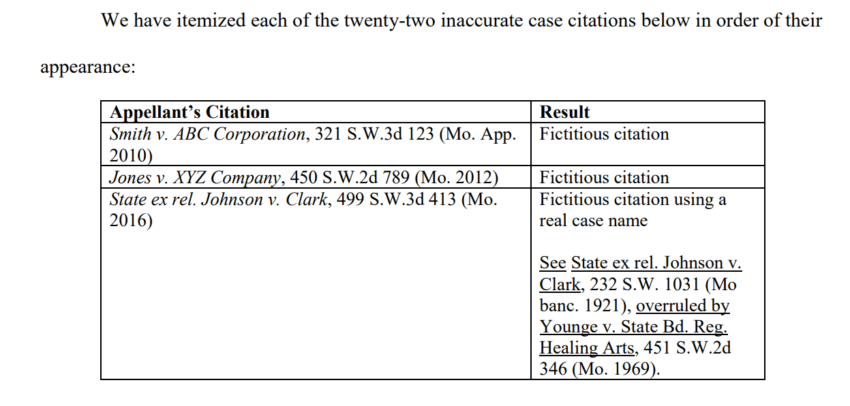A Missouri business owner opted to handle his own appeal following a November 2022 unpaid wages judgment ($311,313.70 with interest accruing 9% per year).
For the research and writing part, the self-represented business owner hired an online consultant who claimed to be a California-licensed attorney. (See page 2 of the Reply brief for the explanation.)
As if the possible unauthorized practice of law by the online consultant wasn’t bad enough, the consultant used AI for legal research. Twenty-two fake case citations were included in the court filings. In true “show-me-state” fashion, the Missouri appellate court added a multiple-page table listing and detailing each fake citation. Two other cited cases did not hold what the briefing claimed.
The court of appeals panel in Missouri’s eastern district noted several other briefing deficiencies that “preclude[d] meaningful review,” dismissed the appeal as frivolous, and sanctioned the self-represented litigant $10,000 for the other side’s attorney fees.
Calling the appellant’s submission of fictitious cases an abuse of the judicial system, the court urged “all parties practicing before this Court, barred and self-represented alike, to be cognizant that we are aware of the issue and will not permit fraud on this Court in violation of our rules.”
Here’s a good reminder from Texas Law Help that free or low-cost AI like ChatGPT cannot do legal research.
Can AI help with legal research?
No. Free or low-cost AI like ChatGPT cannot do legal research. It might give answers that look good but have wrong information.
Specialized AI tools for legal research do exist, but they are costly and meant for lawyers. Lawyers have training that lets them sort through good and bad results.

